Skilled Worker Visa via Self Sponsorship
If you are planning to start a business in the UK, or already run one here, you may qualify for a Skilled Worker visa through self-sponsorship.
Self Sponsorship Visa Consultation
-
Time: 60 Mins (Over Zoom)
60 minutes @ £100+VAT
Language Options: (English/Urdu/Hindi/Punjabi)
This detailed consultation is tailored to assess your eligibility, your business and guide you through the Self-Sponsorship Visa route.
Please have your questions and relevant information ready. All Bookings are non-refundable.
-
Authorised and Regulated
by SRA, England and Wales
-
Proven track record in
sponsor license & visa applications
-
We are open Mon-Fri
9:00am to 6:00pm, 24/7 in emergency
What is Self Sponsorship Visa?
A self-sponsorship visa is not a separate visa category in the UK. Instead, it is a pathway that allows you to set up or acquire a UK company and then use that company to sponsor yourself for a Skilled Worker visa.
This route is particularly suited to people with business acumen and entrepreneurial drive who want to run their own business in the UK. It offers a way to combine building a company with securing the right to live and work here, without needing a traditional employer to act as your sponsor.
In practice, the process works in stages:
- You establish or buy a genuine UK business.
- That business applies for a Skilled Worker sponsor licence from the Home Office.
- Once the sponsor licence is approved, your company can issue a Certificate of Sponsorship for a skilled role within the business. The role must be genuine and clearly connected to the needs of your company.
- You then apply for a Skilled Worker visa on the basis of that sponsorship.
This option is particularly attractive to entrepreneurs and business owners who want to live and work in the UK while running their own company. It offers a degree of independence compared with traditional employment-based sponsorship.
However, the Home Office will carefully examine both the business and the role to make sure they are genuine.
This means your company must be properly set up, legally compliant, and capable of meeting the ongoing duties of a licensed sponsor and wider UK laws.
Can I really sponsor myself for a Skilled Worker visa?
There is no visa in the UK officially called “self-sponsorship”. What this term refers to is using your own UK company to sponsor you under the Skilled Worker route. To do this, you must first set up or acquire a genuine UK business. That company then applies for a Skilled Worker sponsor licence. Once the licence is approved, your company can assign you a Certificate of Sponsorship for a skilled role in the business, which you use to apply for your visa.
So yes, it is possible to sponsor yourself, but only if both you and your company meet the strict requirements set by the Home Office.
How much does self-sponsorship cost?
Home Office costs for self-sponsorship:
Sponsor Licence Application Fees
- Sponsor licence application fee (small sponsor rate): £574
- Optional priority processing: +£500
- Certificate of Sponsorship (CoS): £525 per certificate
Immigration Skills Charge (ISC):
- £364 for the first 12 months
- £182 for each additional 6 months
Skilled Worker visa application fee (main applicant & dependants):
- Outside the UK: £769 for visas up to 3 years; £1,519 for over 3 years
- Inside the UK: £885 for up to 3 years; £1,751 for longer stays
Immigration Health Surcharge (IHS):
£1,035 per person, per year
*These are official Home Office fees and subject to change through home office notifications, and also do not include legal or advisory fees you may incur with NARA Solicitors.
What are the eligibility requirements for self-sponsorship?
To qualify for a Skilled Worker visa via self‑sponsorship, you must demonstrate to UK Visas and Immigration that:
- You’re aged 18 or over.
- You have a UK company that is active and genuinely trading.
- Your business has been granted a Skilled Worker sponsor licence.
- Your company has issued you a valid Certificate of Sponsorship for a skilled role.
- The vacancy is genuine and meets the correct skill level.
- Your salary meets or exceeds both the general threshold and the role’s ‘going rate’.
- The Immigration Skills Charge has been paid.
- You meet the English language requirement at CEFR Level B1 or higher.
- You can support yourself without relying on public funds.
- You’ve supplied a criminal record certificate and TB certificate, if required.
- Your business must have suitable Key Personnel in place to manage the sponsor licence:
An Authorising Officer who takes overall responsibility.
A Key Contact who liaises with the Home Office.
At least one Level 1 User to manage day-to-day licence duties on the Sponsorship Management System. - Your business has the financial capacity to pay the sponsored role’s salary and meet ongoing obligations.
These remain the core expectations for self‑sponsored visa applicants but not limited to, always seek professional legal advise with authorised solicitors/ consultants.
What’s not required?
Your company does not need to meet any specific requirements around:
• Minimum turnover, total assets, or company age.
• A set number of directors or shareholders.
There is no formal threshold for business size, turnover, or structure when applying for a sponsor licence.
Why this matters
It means even newer or smaller businesses can apply, as long as they can show they’re genuine, trading, compliant and ready to meet sponsor duties. The key is proving the business and the role are genuine, not how big the company is.
Can my dependants join me if I sponsor myself for a Skilled Worker visa?
Yes, dependants can usually join you on a Skilled Worker visa obtained through self-sponsorship.
Your partner and children can apply at the same time as you, or later, and their visas will normally be valid for the same period as yours.
Each dependant must pay their own application fee and Immigration Health Surcharge. You will also need to show that you can support them financially.
Dependants are generally allowed to work or study in the UK, and after five years may also be eligible for settlement if you qualify.
Note: Whether dependants are permitted depends on the specific job code you are sponsored under. If your role is on the eligible list, then dependants can join you.
FAQs - Self Sponsorship
Self-Sponsorship Skilled Worker Visa FAQs
Can I own and run the company that sponsors me?
Yes. You can be both a director and shareholder of your UK company, even holding 100% of the shares, while also being sponsored by that same business for a Skilled Worker visa.
Do I need to show a set amount of investment funds?
No minimum investment is required under the Skilled Worker route. What matters is that your company is a genuine, lawfully operating business and has the resources to pay your salary. Having funds available to grow and sustain the business will, however, strengthen your application.
What kind of businesses are eligible for Sponsor Licence?
There are no restrictions from the Home Office on the type of business or industry that can apply for a sponsor licence. Any UK-registered business may be eligible, whether it is in services, retail, technology, manufacturing, or another sector.
What matters is not the industry, but whether the company can meet the sponsor licence requirements. This includes proving the business is genuine, lawfully operating, and able to comply with the ongoing duties of a licensed sponsor.
Does my business idea need to be innovative?
No. Unlike the Innovator Founder visa, the Skilled Worker route does not require your business to be innovative or endorsed by an external body. Any type of lawful business can qualify, provided it meets the sponsor licence and visa requirements.
Is a business plan compulsory?
A business plan is not strictly required. But it is often very useful to show that your company is genuine, viable, and has a clear path forward. A detailed plan can help the Home Office see that your role is genuine and your company sustainable.
Will I have to pay myself a salary?
Yes. To keep your visa, you must receive a salary from your UK company that meets both the minimum salary threshold and the “going rate” for your job code. The exact figure depends on your occupation and qualifications.
Is there an English language requirement?
Yes. You must demonstrate English language ability to at least CEFR Level B1 (intermediate). You can meet this by passing a Secure English Language Test, holding a degree taught in English, having certain UK school qualifications, or being a national of an English-speaking country.
How long will my visa last?
Your Skilled Worker visa can be granted for up to 5 years, linked to the validity of your Certificate of Sponsorship. After that period, you can apply to extend it.
Can I do other work alongside my sponsored role?
You must work in the role you are sponsored for, but supplementary employment is allowed if it meets the rules. You must always continue to work in your sponsored job as your main role.
Can self-sponsorship lead to settlement?
Yes. After 5 continuous years in the UK on a Skilled Worker visa, you may qualify for Indefinite Leave to Remain (ILR). You will need to meet the salary threshold at the time, continue to work for your sponsoring business, and pass the Life in the UK test (unless exempt).
Client Testimonials
Self-Sponsorship for a Fitness Trainer with the courage to start their own venture in the fitness industry
Recent Success Stories
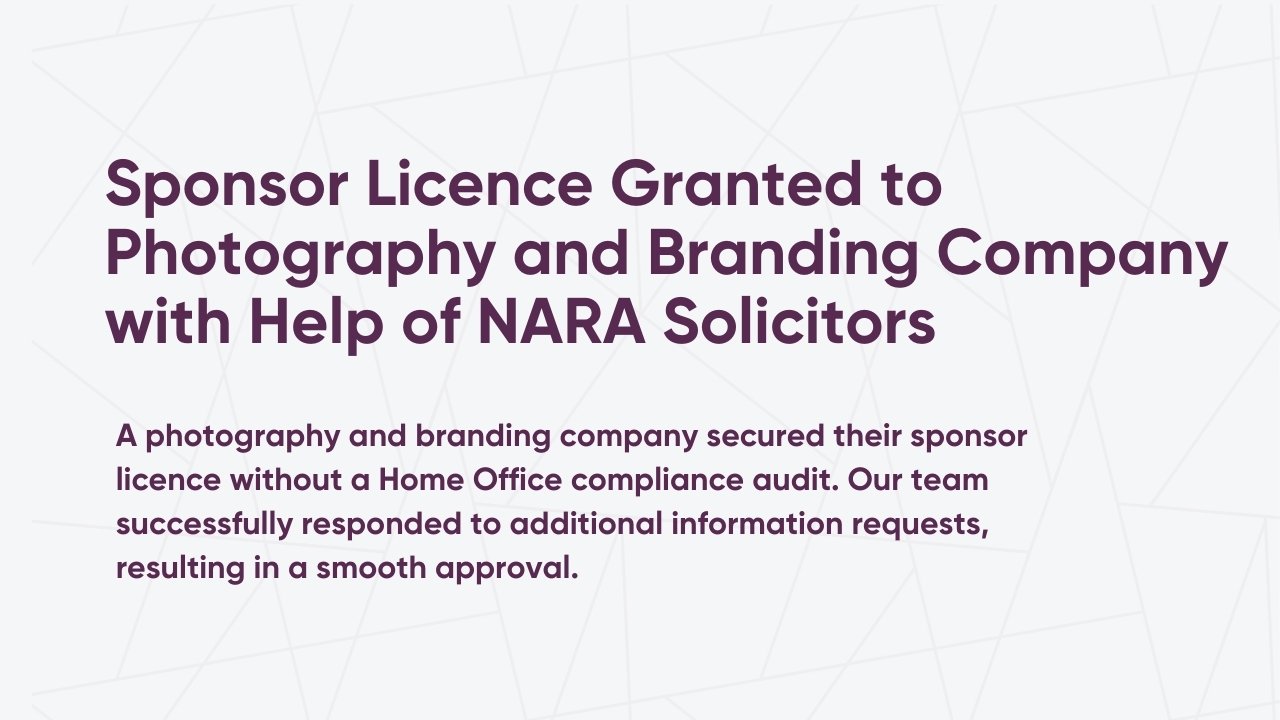
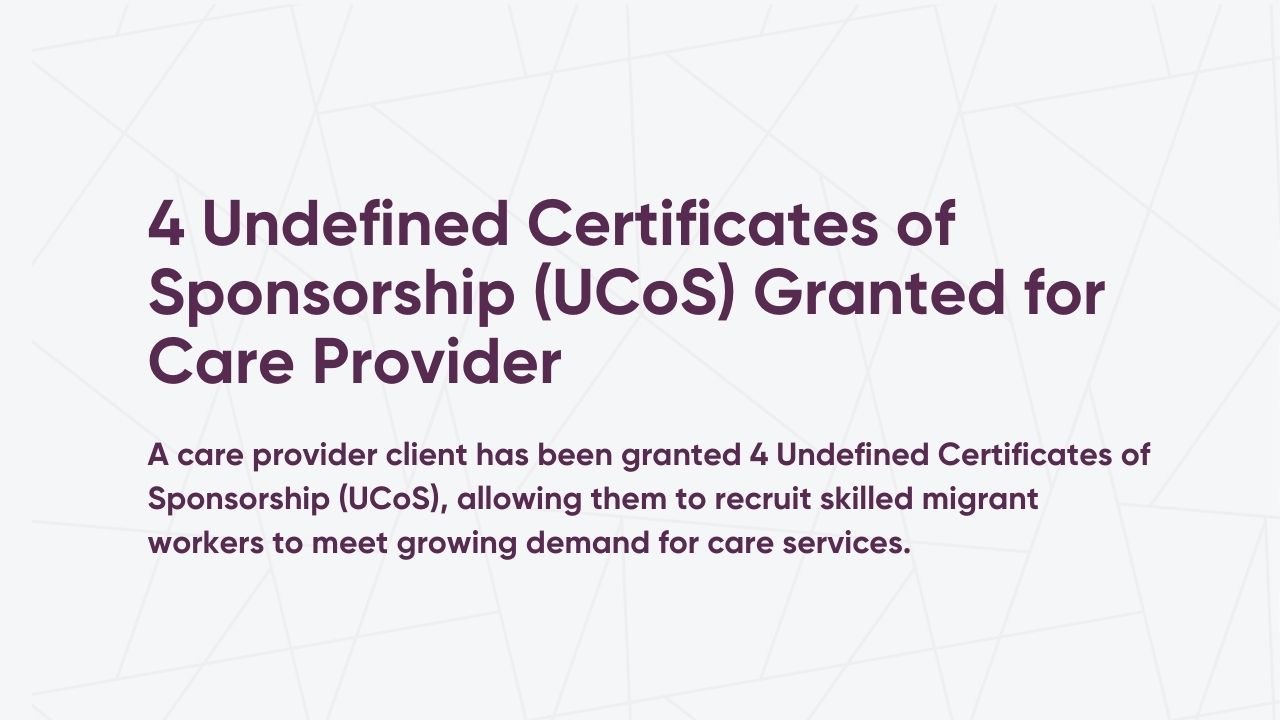
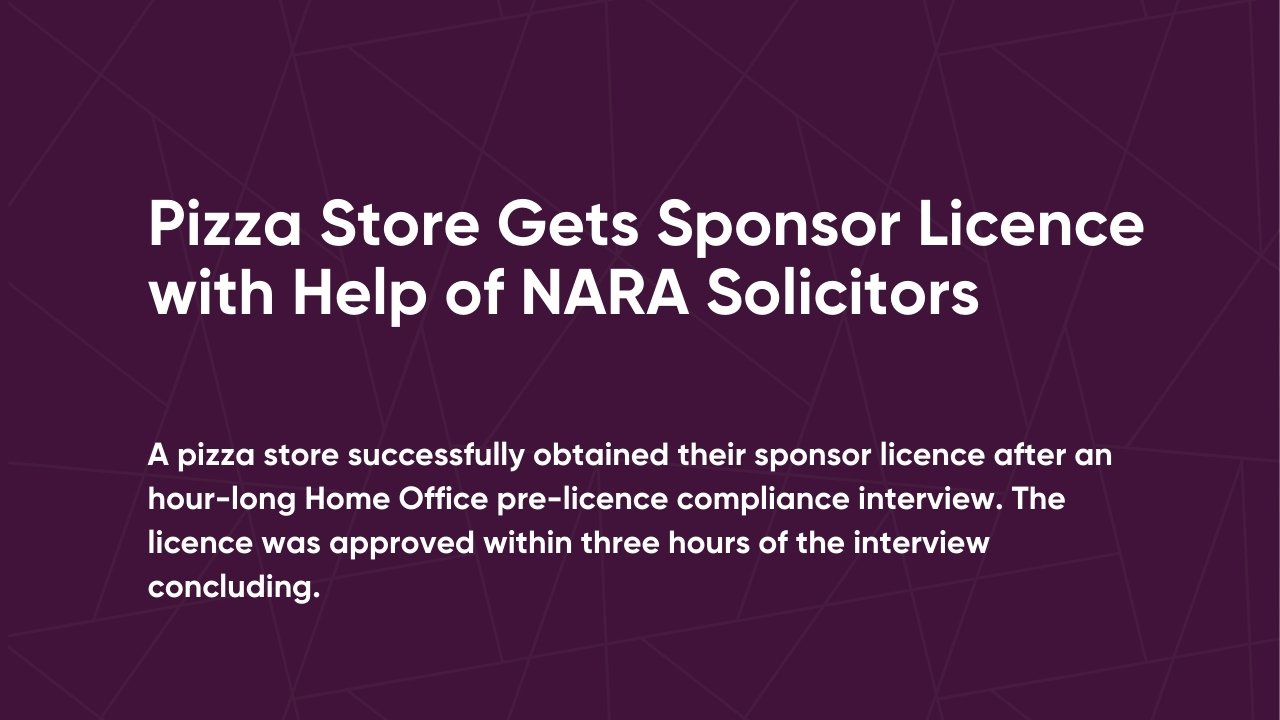
Pizza Store Gets Sponsor Licence with Help of NARA Solicitors
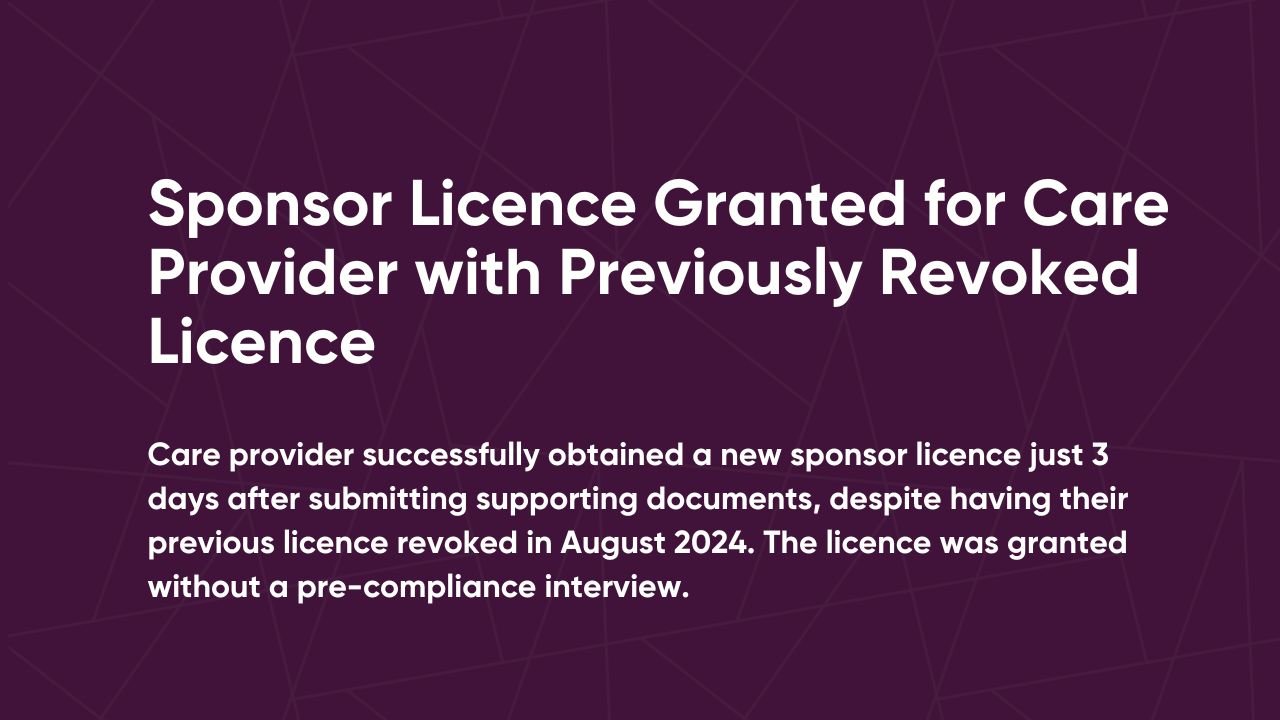
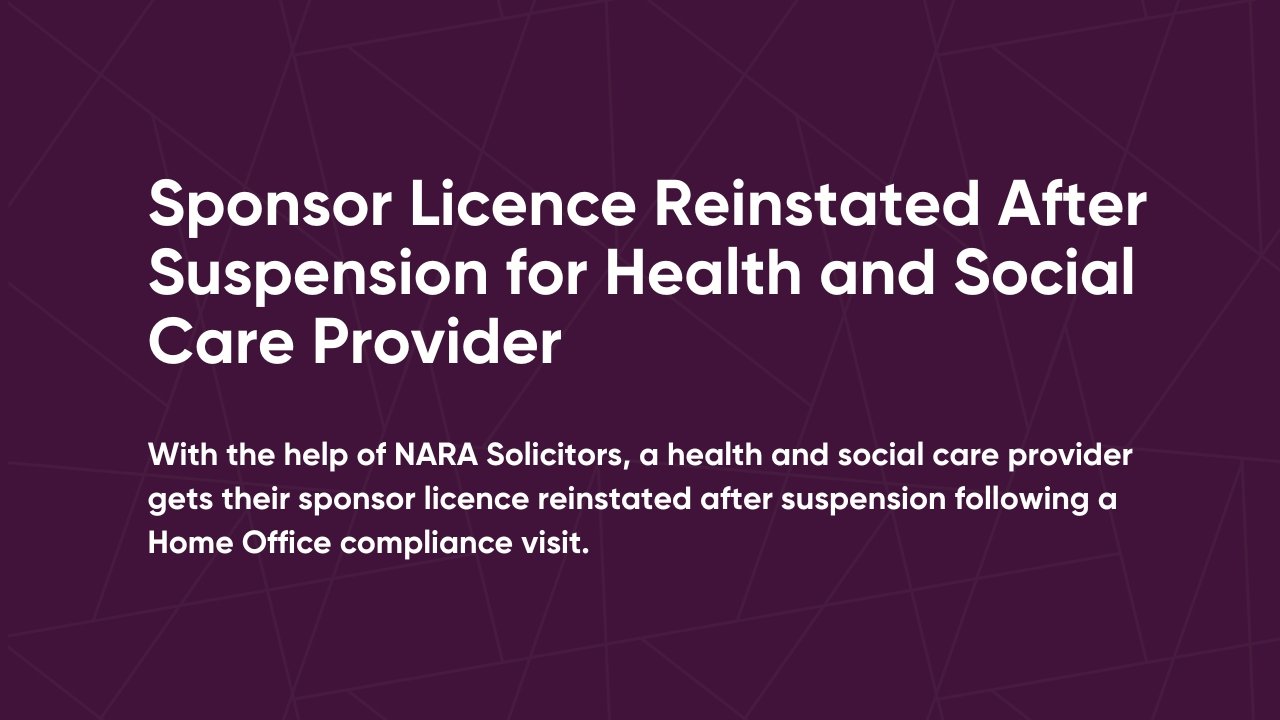

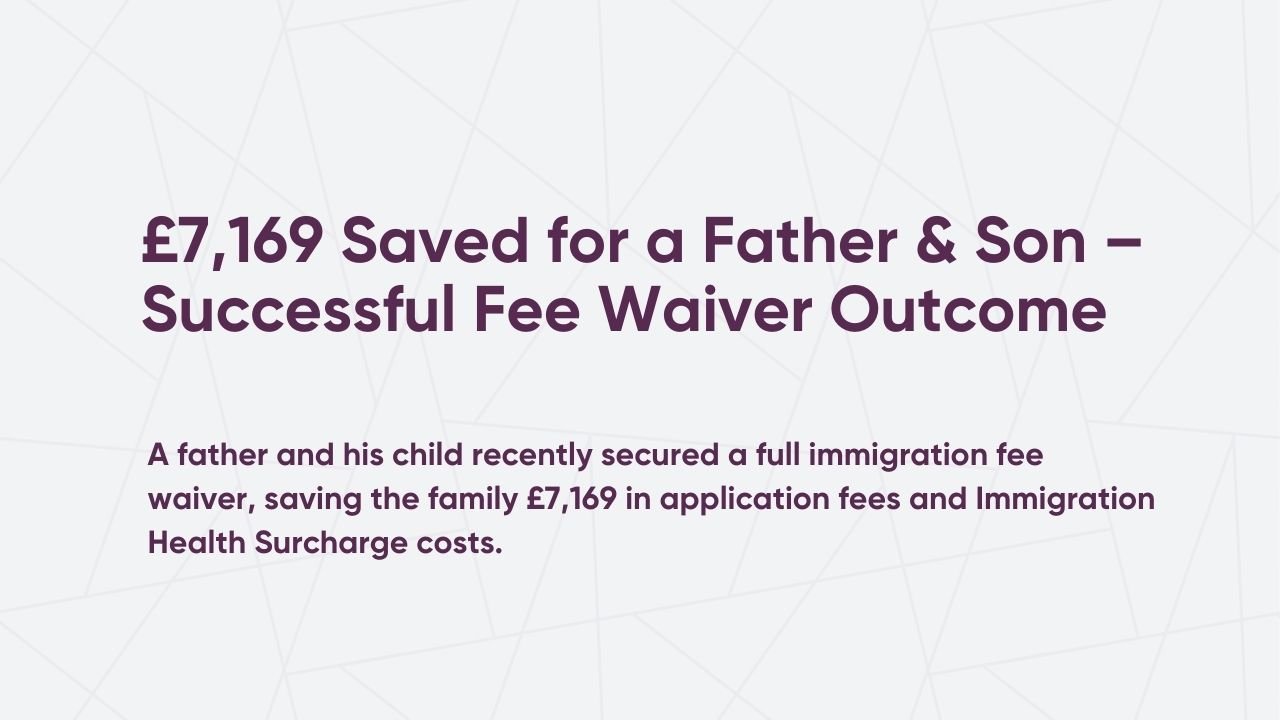
£7,169 Saved for a Father & Son – Successful Fee Waiver Outcome
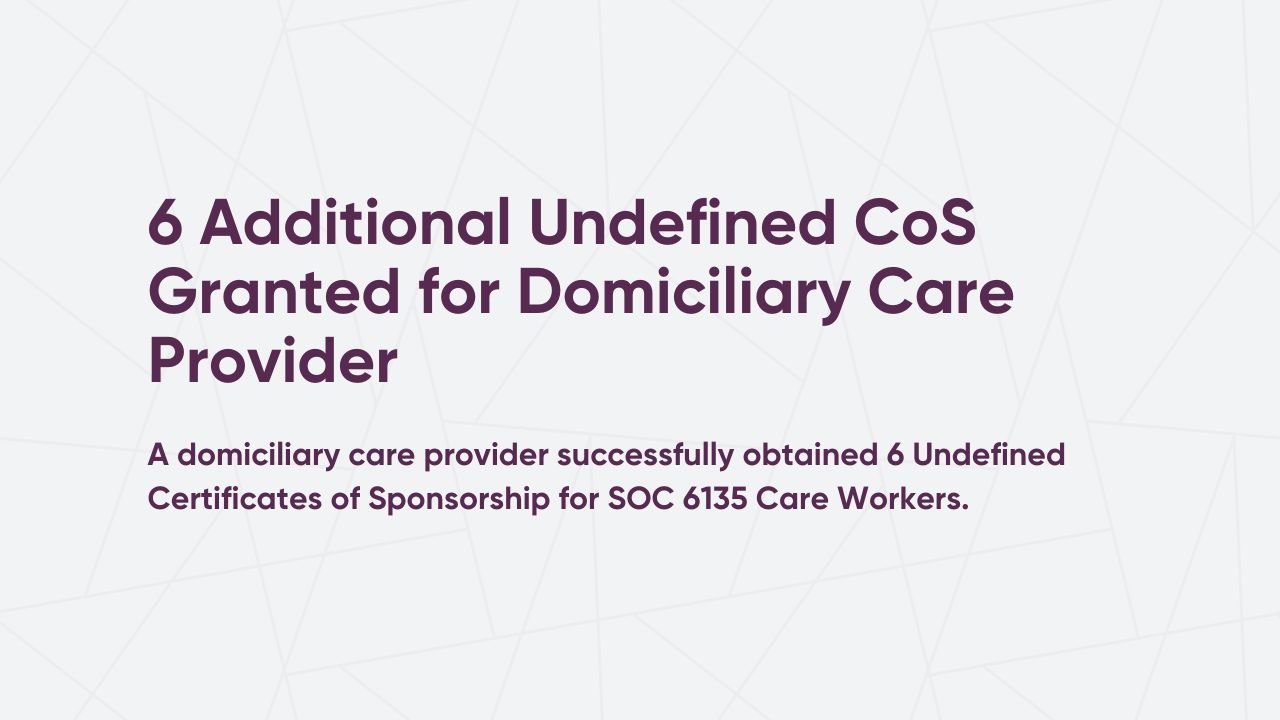
6 Additional Undefined CoS Granted for Domiciliary Care Provider
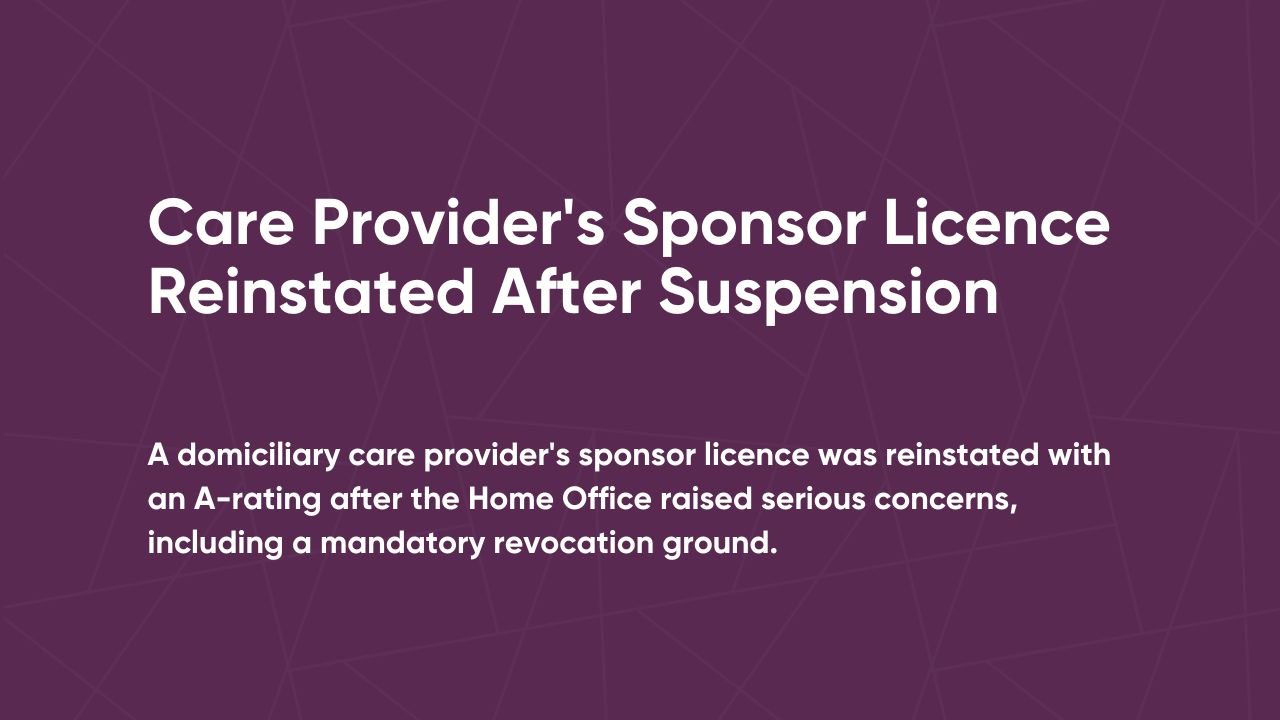
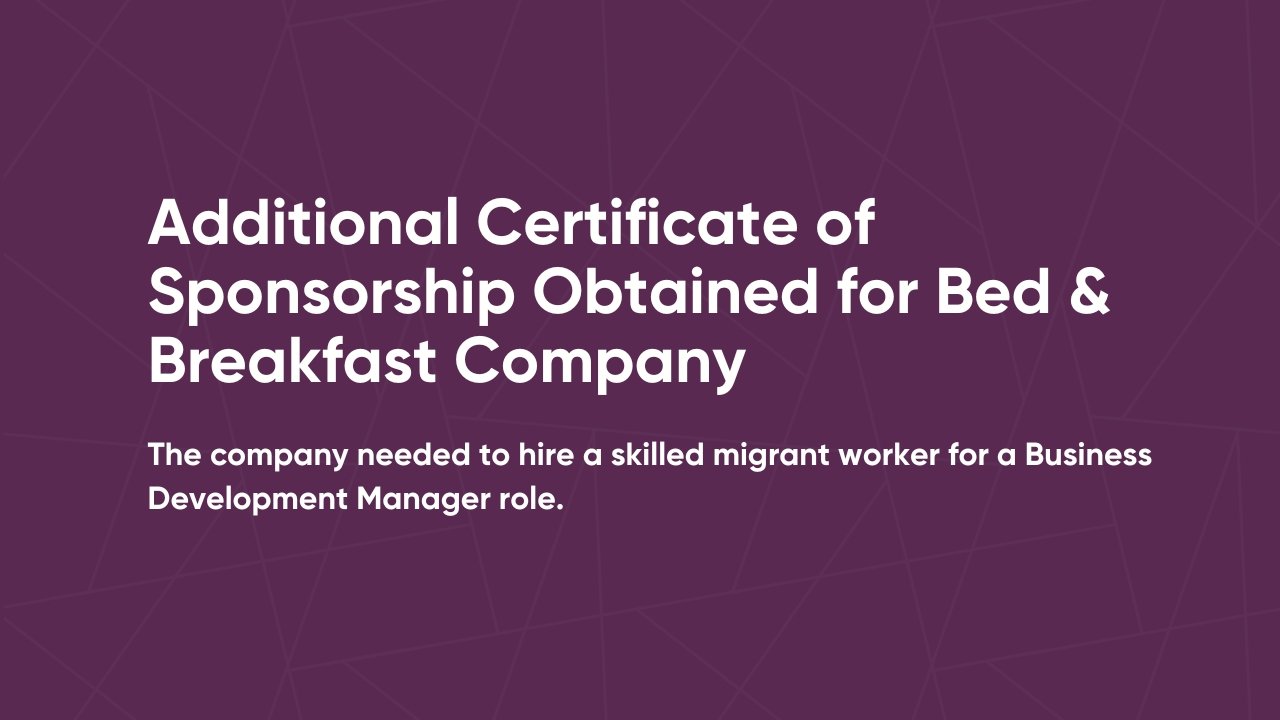


Special thanks to Mr. Sukhvinder Nara Ji and Sonal Ji.
Our case looked very impossible, every solicitors we spoke to were very dismissive and made us want to give up.
We saw a very good review online of how Nara solicitors helped one provider to get their license back in a very short period. We immediately contacted them. I first spoke to Prageti who was very kind to get me an appointment immediately with Mr Nara , Gauri, TJ and Sam.
A very short meeting that gave us hope. They requested for a lot of documents at first and we provided everything immediately not knowing that what they did was to ensure we are compliant with all the guidelines before taking the case. Their integrity is very important to them as a law firm.
We worked with Gauri, very intelligent, kind, respectful, professional and empathetic lady. Gauri made the case look easy and was always assuring me that she will do her best and she over did her best.
Honestly, I can write ten
pages of my wonderful experience without writing the outcome of our case😅
Our Pre Action Protocol was refused by the Home Office and we lost all hope but Mr Nara advised us to give them the chance to challenge the case in court through Judicial Review.
At that point we were confused and hopeless! We trusted them to try and they went above and beyond to draft this case.
A case we were told would take 2 to 3 months didn’t take up to two weeks to be resolved!
Here is part of the lines of the letter from the SSHD to the court following our submission of our Judicial Review Application.
Am instructed that the Defendant is looking to concede this matter and a consent order will be sent to
the Claimant’s solicitors shortly, providing for the decision under challenge dated 4 October 2024 to be
reconsidered within 3 months of the sealing of a proposed consent order, absent special
circumstances.
4. The Defendant confirms that she will amend the status of the sponsor licence to suspended, within 5
working days of the sealing of a proposed consent order. The Defendant will thereafter provide the
Claimant the opportunity to provide submissions, the Claimant’s submissions will be considered during
the abovementioned reconsideration process.
5. In light of the above, the Defendant considers that interim relief will not be necessary.
Honestly, I lack the right words to describe the fantastic job Gauri did in this case and the professional advice given by Mr Nara in this exceptional case!
If you ever find yourself in a similar situation please don’t hesitate to contact Nara solicitors to get the professional help you need to resolve your case.
Well done Gauri and everyone at Nara Solicitors firm!!
I am especially grateful to Tejinder Singh and Ipshita khatri for her outstanding professionalism, dedication, and attention to detail. Both of them support was exceptional, and played a vital role in successfully helping me obtain a PSW visa. And again I heartily thanks Tejinder Singh and Ipshita khatri.
Thank you for your patience, clear communication, and commitment from start to finish. I highly recommend Nara Solicitors to anyone seeking reliable and professional immigration support.
Our case was quite tricky as I am self-sponsored, and we were initially unsure how the application would go through. From the very beginning, Sukhwinder Nara provided expert guidance, clear advice, and reassurance at every stage. His knowledge and experience made a complex situation feel manageable and well-structured.
A special mention to Ipshita, who was our case worker throughout the process. She handled all the paperwork, documentation, and application filing with great attention to detail. She was always responsive, organised, and patient in answering our questions, ensuring everything was prepared correctly and submitted on time.
Even though we submit priority application but result came through next day after biometrics shows how well the homework was behind through the process.
Thanks to their professionalism and thorough handling of our case, both my wife’s and my ILR applications were approved successfully. We truly appreciate the dedication and support from the entire team at Nara Solicitors and would not hesitate to use their services again or recommend them to others.
We had complexity in our case. They are really professional and they guided us throughout the whole process specially thanks to Sukhvinder sir and Arun dhanda sir
If someone has complexity in their case please visit Nara solicitors
Thank you
Regards Asif Raza
I am especially grateful to Ipshita for her outstanding professionalism, dedication, and attention to detail. Her support was exceptional, and she played a vital role in successfully helping my wife obtain her dependant visa.
Thank you for your patience, clear communication, and commitment from start to finish. I highly recommend Nara Solicitors to anyone seeking reliable and professional immigration support.
They were always there when I needed them, kind, patient, and supportive throughout the process. They are not only professional but genuinely good people who truly care about their clients. I highly recommend them.
Mr Sukhwinder Nara has been highly supportive and Mrs Sonal Mann ma’am has been the kindest and the most hardworking professional that came across in last 3 years in UK.
Was a great experience with highly respected and experienced professionals.
A must recommend for a haste free and smooth journey.
Thank you Nara team … I Highly recommend Nara solicitors! 💯🌟🌟🌟🌟🌟